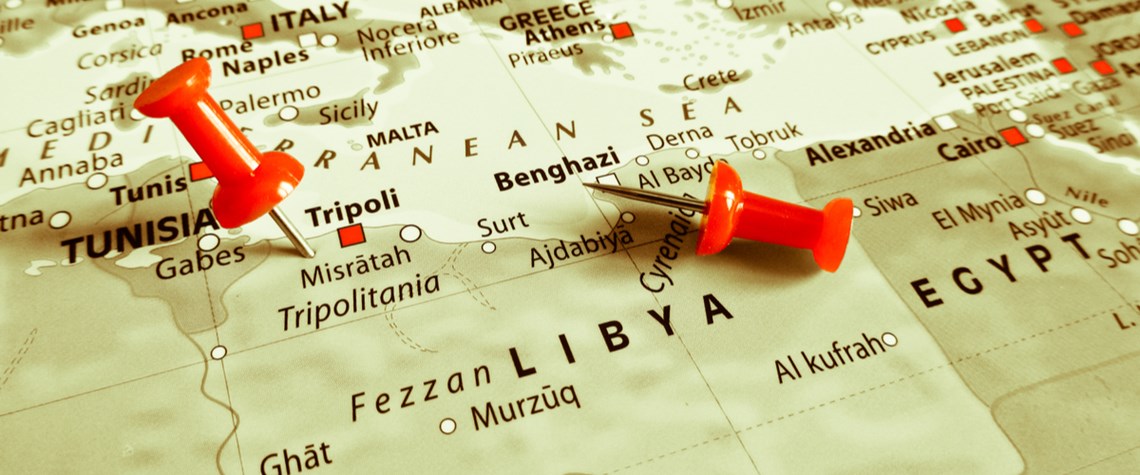The geopolitical scene in the Eastern Mediterranean is being reshaped by oil and gas discoveries. Alliances are constantly shifting as sovereign states vie with each other to capitalise on their reserves, hoping to boost economic growth and restart troubled economies after years of security challenges and conflict.
Huge swaths of the East Med remain untapped. Libya has the largest oil reserves in the region, if not in all of Africa, with the potential to produce up to 3mn bl/d of oil. Assessments suggest Cyprus, Israel and Lebanon are home to trillions of cubic feet of natural gas.
International interest in licence bidding rounds, notably in Lebanon and Israel, from key industry players such as Total, Italy’s Eni and London and Tel-Aviv-listed explorer Energean also reflect the region’s production potential.
Strong international participation in Egyptian Natural Gas Holding Company’s 2018 offshore licensing round similarly demonstrates continued interest even in more heavily explored countries.
Risk averse
Domestic and international political tensions still have a tendency to influence the outlook of the oil and gas sector in the East Med. The relative political stability of Egypt, and its focus on sectoral reform, has aided the development of its oil and gas sector, resulting in 14 E&P deals between March and October and $75bn in projected investment.
But political instability has deterred investors elsewhere in the region. Conflict threatens valuable infrastructure and (in some cases) sanctions make investment risky.
In Libya, where conflict has dramatically damaged the oil sector, national institutions continue their efforts to revive oil production while seeking to accommodate competing factions.
Production in Libya returned to a pre-2011 capacity of 1.1mn bl/d in October. And output could easily reach 1.8mn bl/d if available storage facilities—destroyed during the almost decade-long conflict—are repaired.
In Lebanon, political disruption has repeatedly delayed the submission of bids for a second offshore licensing round. But potential political change in Libya and Lebanon might increase the appetite of investors. The prospects of national elections and/or new governments in both countries offer the possibility of reforms that could reinvigorate the entire oil and gas sector.
Turkish influence
The outlook is also dependent on the evolution of wider regional tensions. Relations between Turkey on the one hand, and Israel, Egypt, Greece and Cyprus on the other, are becoming increasingly strained. The latter four are particularly opposed to what they see as growing Turkish influence in the region.
Political stability and alliances are being affected by opposition to the maritime bilateral agreement between Libya and Turkey. Other countries dispute Turkish drilling in Greek-claimed waters and challenge Ankara’s interests in strengthening cooperation with Beirut and beyond the region into Azerbaijan and Russia.
But there are grounds for optimism. Attempts to settle a maritime dispute between Lebanon and Israel—enabling hydrocarbon exploration—reflect a growing recognition that regional tensions undermine the economic potential of the oil and gas sector for the region as a whole.
Libyan roadmap
Even in a best-case scenario, many challenges lie ahead. Security issues in surrounding countries, such as Syria, pose a continued risk to infrastructure and political stability. And energy importers such as Turkey, Lebanon and Cyprus are likely to prioritise domestic requirements, limiting the profitability of exports.
Potential export routes through Egypt and Turkey are at the mercy of regional flare-ups. Nonetheless, hydrocarbon-driven growth in Israel, Egypt and Greece offers hope that the sector might, given time, help alleviate economic crises in the region. Weaker economies in Libya, Lebanon and Cyprus would themselves clearly benefit from the development of the oil and gas sector.
In Libya, stability concerns are still an issue. Recent fighting around Tripoli and the withdrawal of the eastern-based Libyan National Army imply two possible outcomes. The first is political and economic stagnation, with the warring parties accepting the status quo to ensure access to oil revenue for local economic needs.
The second outcome, and one more likely to be pursued by the incoming Biden administration in the US, is the eventual success of the UN-led political dialogue. Progress could result in the formation of a unified interim government to oversee the route to a constitutional referendum and national elections. This could even be possible in time for the 70th celebration of Libya’s independence in December 2021.
Either way, political stability, coupled with planned sectoral reform and return of international investment, could unleash Libya’s energy production capacities and easily add over 1mn bl/d to global oil supplies, affecting regional and possibly even international oil market stability.
The outlook for the oil and gas sector in Libya and the East Med continues to be plagued by uncertainty, but recent political developments—while not without risk—offer some hope of much-needed stability. The region, which is suffering an economic downturn, would clearly benefit from a boost provided by its potentially highly prosperous oil and gas sectors.
Any views expressed in this publication are strictly those of the authors and should not be attributed in any way to White & Case LLP.
Asma Muttawa is counsel and Michael Polkinghorne is partner at law firm White & Case.









Comments